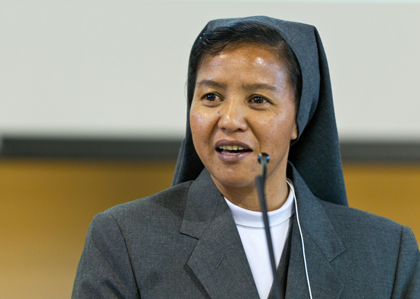The Role of Water Among Women in Shillong, India
Water is a prime resource, a basic human need, and a precious asset, according to Sister Helen Puwein, a native of Shillong, India and head of Bellefonte Community College.
“Every living thing needs water,” Puwein said.
Puwein spoke about the unique societal role of women in the state of Meghalaya in Shillong, India and the need for clean water in a talk last Friday.

Sister Helen Puwein speaks to the role of the social role women and water in India. (Photo by John Froschauer)
The women also do a significant amount of work. In addition to looking after the children, women in Meghalaya must carry water for their family and many seek work outside the home in the mines.
Seventy percent of children drop out of school, many of them to go work in the mines.
“Women are the ones who are suffering from the sanitation problem,” Puwein said. Women are the ones working in the mines and who “suffer most from water borne diseases such as anemia and malaria.”
The community college, where Puwein teaches English is trying to address the high drop out rate, but they also need clean water projects, according to Puwein. Simple water filtration systems and wells would lead to a better life for these women and their children.
“Scarcity of water is a threat to human life,” Puwein said.
About 30 individuals came to her Puwein’s discussion, including first-year Jess Tveit, who intends to study abroad in India next spring.
“I was surprised by how many women work in the mines,” Tveit said. “I didn’t know how bad the water contamination was.”


